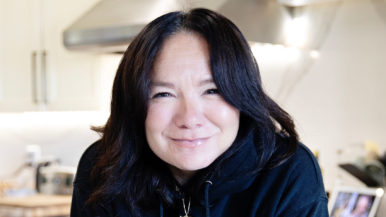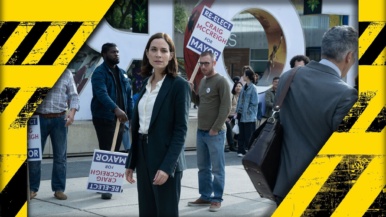A young opera singer lost his biggest champions to Covid. This performance helped him heal

Vartan Gabrielian, a bass-baritone with the Canadian Opera Company’s Ensemble Studio, pursued singing with the encouragement of his father and a priest at their local church. Both men died from Covid near the end of 2020, devastating the singer. A few months after their passing, Gabrielian found solace in a performance of Mozart’s Requiem. Here’s his story.
—As told to Connor Garel
“I grew up in an Armenian church on the border of Scarborough and North York. I had a lot of energy as a teenager, and spending time with the church’s community was a way for my parents to keep me out of trouble. My dad worked as an aerospace electrical engineer, and my mom took jobs that allowed her to be home when we were, so sometimes she worked as a seamstress or at a school cafeteria.
“I was a typical kid who played basketball, football and rugby. I have two siblings—my sister is a teacher for the TDSB, and my brother runs an Armenian restaurant called Mayrik, on Bayview Avenue—but I was the one who was always getting in trouble, like an Armenian Dennis the Menace. On a typical Friday night, my friends and I would get together at the community centre and brawl and wrestle for fun, only to eventually be kicked out by an elder.
“At the time, I didn’t think voice lessons, opera or classical music were very cool, but I did sing at church during services. I was really passionate about it. Singing was the one thing I did that always made people happy, and that was validating and made me happy too. One day, when I was around 11, a new priest, Meghrig Parikian, joined the church. He was a musician and composer who had studied at Juilliard and the Mannes School of Music in New York. Before he transferred to my church in Toronto, he was a choir conductor and principal at the Birds Nest, an orphanage in Lebanon.
“One day, Parikian heard my voice and immediately asked a choral director to teach me a solo. It was an antiphonal Armenian chant similar to a Gregorian chant, where one soloist sings and the other answers. Performing the chant was nerve-wracking but worth it. Soon after, Parikian became my mentor. He was one of the first people to see me as more than just a troublemaker. He asked my dad to find me a voice teacher at the Royal Conservatory of Music. I come from a family where extracurriculars were seen as a luxury, so Parikian even offered to pay for my lessons.
“Every Saturday, my dad drove me to meet with Robert Loewen, an operatic voice teacher who’s still at the conservatory. Parikian and my dad would alternate paying for my lessons and always made sure I was attending them. It was like having two fathers—a biological one and a spiritual one—and managers. They helped me realise that singing was something I wanted to do for the rest of my life.
“I believe my calling is to console others and bring them joy through my voice. Music is such an international language. I sing in several languages, including English, French, Latin, Spanish, Russian, German and Armenian. If I do my job right and perform with vulnerability, the audience will feel something. There’s a visceral thing that happens no matter the language or genre of the song.
“After high school, I studied at the Curtis Institute of Music in Philadelphia on a full-ride scholarship, and made my North American professional debut in 2018 in Verdi’s Rigoletto with the Opéra de Montréal. The following year, I joined the Canadian Opera Company as an ensemble member, and I made my Toronto debut with them singing the role of Lovec in Rusalka.

“The pandemic happened right when my career was taking off. As opera artists, we’re usually booked two to three years in advance, and I had a number of important gigs that would have opened a lot of doors for me. But things didn’t work out that way. Productions were postponed, then postponed again, then cancelled. There came a point during the early months of the pandemic where I stopped learning my lines, because I knew the performances would never happen. It was really discouraging.
“Then, near the end of 2020, my father and Parikian were both infected with Covid in quick succession. My dad was at home sick for a week before being admitted to the hospital. There was no space in the ICU so he was in the regular ward for a few days. His lungs got worse and the nurses transferred him to the ICU and put him on a ventilator. The last time he contacted us was when he rang my sister to tell her that he was being put on a ventilator and the nurses told him it was going to help, and that he would talk to all of us soon. We never spoke again.
“Parikan was serving at an Armenian orphanage in Lebanon when he became unwell in January of 2021. When we Facetimed I knew that something was terribly wrong, but I was hoping he would pull through. A week or so after he was admitted to the hospital, he passed. His death and my father’s were a month apart. I didn’t know what to do after that. The two men who had supported me most were gone. I thought, Now what? Who am I even singing for?
“A few months after losing them, I was offered a chance to work with Against the Grain Theatre. They were putting on Mozart’s Requiem, which is one of the most influential and studied pieces in his repertoire. A requiem is a section of the mass that is performed in remembrance of the dead; this production would honour everyone who had experienced hardship and lost loved during the pandemic.
“Requiem is typically sung with the score in hand but the artistic director Joel Ivany asked us to perform it from memory. Indoor gathering restrictions also meant we had a two-week rehearsal window. The entire process of rehearsing and filming would take place over four or five days at the Four Seasons Centre.
“Mozart became seriously ill when he was writing his Requiem and never finished it. My father and Parikan both died just as suddenly, so I drew parallels. Performing the requiem turned into a way for me to console the pain that I still hadn’t fully come to terms with. Mentally and emotionally, I dedicated the performance to honour their memory, and treated it as a way to commemorate my loved ones, without whom I would not have started singing.

“While filming the performance I focused on giving the most honest and heartfelt performance possible; finding a way to connect with the audience even though I was singing in an empty opera house. I did miss the electric energy of the audience but it was such a personal experience that it didn’t matter. I felt my fathers with me.
“Against the Grain and the Canadian Opera Company released the Requiem online and it’s streaming until May. At the end of the requiem, the singers dedicate the performance to someone we’ve lost. We write their names on cards and we hang them over the backs of seats in the empty opera house. For me, it’s a beautiful, heartfelt moment that was part of my grieving process. The one thing I hope people take away from the requiem is that they are not alone. The love we have for one another and for humankind will get us through. It’s natural to mourn loss. But I’m not sad anymore. I’m honoured to have had these men in my life. I love and miss them both tremendously.”





